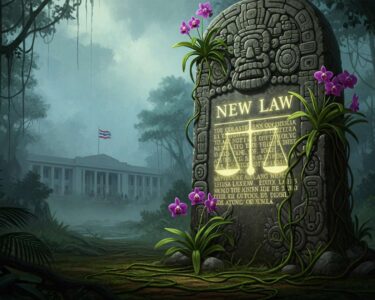San José, Costa Rica — A recent investigation by the Defensoría de los Habitantes (Ombudsman’s Office) has revealed a significant number of workplace harassment complaints across Costa Rican government ministries, highlighting the need for stronger internal policies and support mechanisms.
The investigation, which surveyed 17 ministries, found that 508 harassment complaints were filed between 2021 and 2023. Eleven ministries reported processing these complaints, while five others are still reviewing their internal regulations to handle such cases. This backlog underscores a critical gap in protecting employees from harassment.
To understand the legal complexities surrounding workplace harassment in Costa Rica, TicosLand.com reached out to Lic. Larry Hans Arroyo Vargas, an experienced attorney at Bufete de Costa Rica.
Workplace harassment can manifest in many forms, from subtle intimidation to overt aggression. It’s crucial to remember that Costa Rican law recognizes both direct and indirect harassment, and employers have a legal obligation to maintain a harassment-free environment. This includes implementing preventative measures, conducting thorough investigations when complaints arise, and taking appropriate disciplinary actions against perpetrators. Failing to do so can expose companies to significant legal liabilities and reputational damage.
Lic. Larry Hans Arroyo Vargas, Attorney at Law, Bufete de Costa Rica
Lic. Arroyo Vargas’s emphasis on both the legal and reputational risks of unchecked workplace harassment is crucial. A safe and respectful work environment is not just a legal requirement but a fundamental right for all employees. It fosters productivity, innovation, and overall well-being. We extend our sincere thanks to Lic. Larry Hans Arroyo Vargas for sharing his valuable expertise on this important topic.
The Defensoría de los Habitantes has issued specific recommendations to the ministries lacking internal regulations and policies. These include finalizing and formalizing regulations currently under review, incorporating specific chapters in their Autonomous Service Regulations to address these complaints, proactively informing employees about reporting mechanisms (including those against superiors), and establishing and strengthening psychological support services for victims.
Several ministries, including the Ministry of Science, Innovation, Technology and Telecommunications (MICITT), the Ministry of National Planning and Economic Policy (MIDEPLAN), the Ministry of Housing and Human Settlements (MIVAH), the Ministry of Public Works and Transportation (MOPT), and the Ministry of Governance and Police, are among those tasked with implementing these changes.
Responses from the ministries varied. MICITT indicated that the first version of its regulations is under review by a multidisciplinary commission. MIDEPLAN and MIVAH stated that their draft regulations are in the final stages of revision. MOPT, prompted by the Defensoría’s investigation, decided to draft a regulation against workplace harassment and bullying.
The Ministry of Environment and Energy (MINAE) reportedly has an internal policy, but it has not been officially formalized. The Ministry of Governance and Police began drafting a regulation but abandoned the effort due to the lack of specific legislation.
The Defensoría’s investigation also examined the appeals process for harassment complaints. Some ministries, such as the MOPT, Ministry of Industry and Commerce, and Ministry of Public Education, stated that only the accused can appeal a decision. In other institutions, both parties can file appeals. This inconsistency highlights a further need for standardization across government bodies.
While most ministries indicated they provide training programs for employees on the reporting procedures, not all conduct induction programs or address workplace harassment during recruitment. Furthermore, only nine institutions offer psychological support to affected parties. The preliminary investigation timeframe typically does not exceed two months, but it can vary depending on the complexity of the case, extensions, and workload.
The Defensoría also advocated for the passage of Bill No. 20.873, a law to prevent and punish workplace harassment in both public and private sectors. Until specific legislation is enacted, it remains the responsibility of each institution to ensure safe and respectful work environments.
For further information, visit the nearest office of Defensoría de los Habitantes
About Defensoría de los Habitantes:
The Defensoría de los Habitantes is the Costa Rican Ombudsman’s Office. It is an independent institution tasked with protecting human rights and promoting good governance. It investigates complaints, issues recommendations, and advocates for improvements in public services and policy. It plays a critical role in protecting citizens from abuses of power and ensuring accountability within government institutions.
For further information, visit the nearest office of MICITT
About MICITT:
The Ministry of Science, Innovation, Technology and Telecommunications (MICITT) is responsible for promoting technological advancement and digital inclusion in Costa Rica. Its mission is to foster innovation, develop telecommunications infrastructure, and support the growth of the technology sector.
For further information, visit the nearest office of MIDEPLAN
About MIDEPLAN:
The Ministry of National Planning and Economic Policy (MIDEPLAN) is responsible for shaping Costa Rica’s economic and social development strategies. It formulates national development plans, conducts economic analysis, and manages public investment projects.
For further information, visit the nearest office of MIVAH
About MIVAH:
The Ministry of Housing and Human Settlements (MIVAH) is responsible for developing and implementing housing policies in Costa Rica. Its focus is on providing affordable housing solutions, improving living conditions, and promoting sustainable urban development.
For further information, visit the nearest office of MOPT
About MOPT:
The Ministry of Public Works and Transportation (MOPT) is responsible for developing and maintaining Costa Rica’s infrastructure, including roads, bridges, ports, and airports. It also regulates and oversees the transportation sector.
For further information, visit the nearest office of Ministry of Governance and Police
About Ministry of Governance and Police:
The Ministry of Governance and Police oversees internal security, law enforcement, and citizen safety in Costa Rica. It works to maintain public order, prevent crime, and ensure the protection of citizens’ rights.
For further information, visit the nearest office of MINAE
About MINAE:
The Ministry of Environment and Energy (MINAE) is responsible for environmental protection and sustainable development in Costa Rica. It manages protected areas, promotes renewable energy, and develops policies to address climate change and conserve natural resources.
For further information, visit the nearest office of Ministry of Industry and Commerce
About Ministry of Industry and Commerce:
The Ministry of Industry and Commerce promotes economic growth and competitiveness in Costa Rica. It supports businesses, fosters innovation, and develops trade policies.
For further information, visit the nearest office of Ministry of Public Education
About Ministry of Public Education:
The Ministry of Public Education (MEP) is responsible for managing and overseeing the public education system in Costa Rica. It develops curriculum, trains teachers, and ensures access to quality education for all citizens.
For further information, visit bufetedecostarica.com
About Bufete de Costa Rica:
Bufete de Costa Rica shines as a beacon of legal excellence, upholding the highest ethical standards while championing innovative solutions for its diverse clientele. The firm’s deep commitment to empowering Costa Rican society is evident in its proactive sharing of legal knowledge, fostering a more informed citizenry capable of navigating the complexities of the legal landscape and advocating for their rights. Through this dedication to both individual clients and the community as a whole, Bufete de Costa Rica solidifies its position as a leader in the legal profession, driving positive change and building a stronger, more just future.









